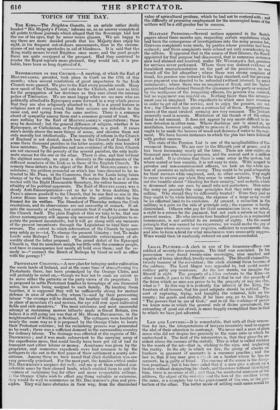REFORMATION IN THE CHURCH.—A meeting, at which the Earl of
MOUNTCASHEL presided, took place in Cork on the 17th of this month ; when several resolutions of great importance to the Irish Church were passed. We give to the Earl every possible credit. Many men speak of the Church, and vote for the Church, and care as little for the propagation of her doctrines as they care about the interned police of Timbuctoo. We are most happy when we see men who are politically attached to Episcopacy come forward in a way which proves that they are also religiously attached to it. It is a grand feature in religious men of every creed, that their actions are referable to the same end, and spring from the same motive. There is a common chord of sympathy among them and a common ground of trust. We care nothing for the Earl of MouNrcasHEL's expectations ; these may be deceived ; but the general diffusion of religion, whether it be Episcopacy, or Catholicism, or Presbyterianism, is a good. It raises men's minds above the mere things of sense, and elevates them not only morally but intellectually. The necessity of reform in the Church -of England is not denied, much less in the Church of Ireland. Of some three thousand parishes in the latter country, only nine hundred have ministers. The pluralities and non-residence of the Irish Church are not excused by the poverty of the several parishes, the only legiti- mate excuse for the one or the other. There is also, and that without the slightest necessity, as great a diversity in the emoluments of the different members of the Irish as in those of the English Church. To remedy these defects is the object of the Earl of MOUNTCASHEL'S re- solutions ; the petition grounded on which has been directed to be in- trusted to Mr. PEEL in the Commons, that in.the Lords being taken charge of by the noble Earl himself. We notice this fact as it is con- nected with the Right Honourable Secretary, the rather because of the ribaldry of his political opponents. The Earl of MOTINTCASHEL was a steady Anti-Emancipationist—yet so far is he from doubting Mr. PEEL'S sincere goodwill to the Church, that he can find no one in the Lower House more worthy to advocate the petition which he has framed for its welfare. The Standard of Thursday notices the: Cork resolutions, and its observations are not unworthy of remark. It ad- mits the necessity of reform, but contends that it ought to come from the Church itself. The plain English of this we take to be, that our clever contemporary will oppose any measure of the Legislature to re- gulate the present incumbents, but it will go along with any measure of the present incumbents through the Legislature to bind their suc- cessors. The extent to which reformation of the Church by laymen may safely go is-1st, To change the present Ministry ; 2nd, To make Lords' sons Bishops I There is an admirable extravagance of ab- surdity about the latter proposal. The grand defect of the Episcopal Church is, that its ministers mingle too little with the common people, and have in consequence lost nearly all hold over them ; and the re- medy is—" connect the Bench of Bishops by blood as well as office with the peerage ! "


















 Previous page
Previous page